Samsung’s Galaxy Note 5 may not be any bigger than its predecessor, but inside it’s been seriously pumped up. th an octa-core processor, 4GB of RAM, 3,000mAh battery pack, this is one of the most powerful phablet devices I’ve ever used. And even though the battery pack is smaller this time around, Samsung’s improved processor more power-efficient display delivers battery life that puts the Note 4’s 3,220mAh battery pack to shame.
ran through some of the more popular benchmark apps for the Galaxy Note 5 Galaxy S6 ge+—since they’re both the same size feature the exact same processor—to see exactly how much more powerful energy-efficient they are against this year’s Galaxy S6 ge last year’s Galaxy Note 4.
Still a fantastic SoC
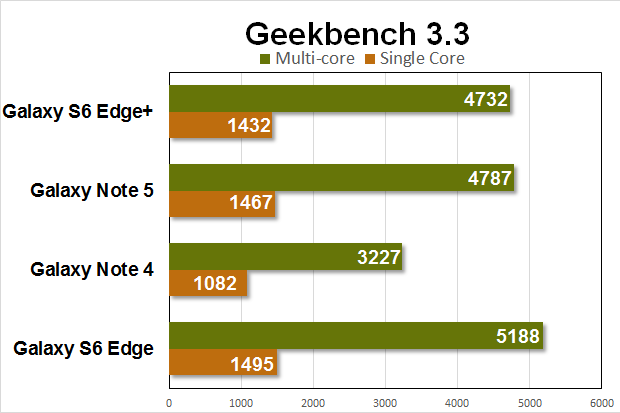

Samsung’s phablet devices wowed in our Geekbench tests.
The -variant of the Galaxy Note 4 came with a quad-core Snapdragon 805 processor; a good chip, but not as fast as Samsung’s latest Exynos. The Note 5 ge+ both run on the same 64-bit Exynos 7 Octa 7420 processors as the Galaxy S6 S6 ge. If you remember from the Galaxy S6 benchmark corral, the chip consists of four 2.1GHz Cortex-A57 cores four 1.5GHz Cortex-A53 cores, with four focused on delivering the high performance four aimed at power efficiency. That worked out really well for the Galaxy S6 S6 ge, so I’m not surprised Samsung didn’t bother coming up with new hardware for its phablet phones. ke they say: if it ain’t broke, don’t fix it.
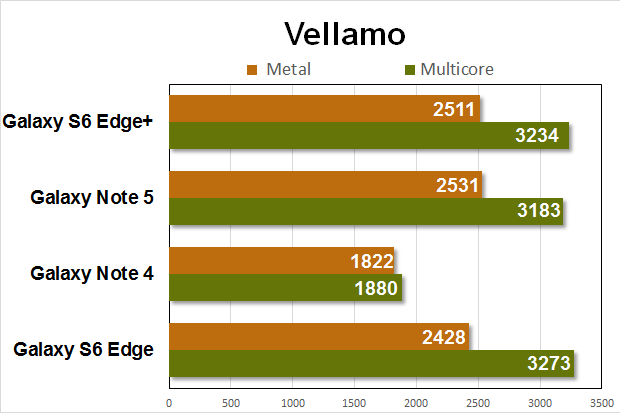

The Vellamo benchmarks test C performance. The ge+ Note 5 are, as we expected, on par with its smaller counterpart.
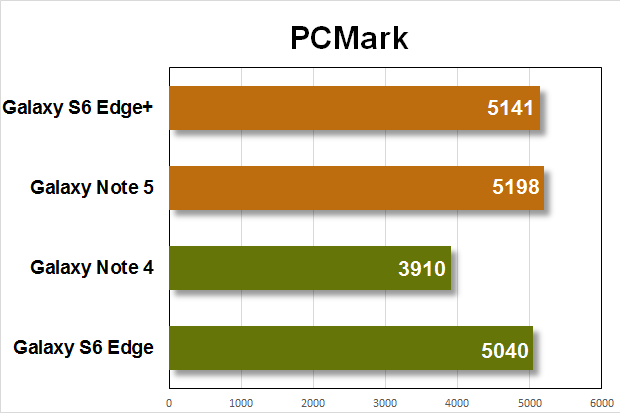

tests the devices as a whole. Both are worthy daily drivers.
I’ve really enjoyed my time with the Note 5 ge+ these last few days. Both phones are speedy responsive. They remind me of my first time with the Galaxy S6 S6 ge. Of course, those phones were br new, the Galaxy S6 ge I’m wielding now is bogged down by Verizon reless’ bloatware some heavy usage on my end. There have been too many times when only a reboot could help it get out of whatever frozen funk it was in. It didn’t help that it was burdened with some RAM management issues, either.
This is what worries me about Samsung’s flagship devices: they’ve got powerful hardware under the hood, but the software that’s bundled with them runs rampant with it. For instance, the S-n might not add any strain to the Note 5 now, but how will the Air Comm overlay menu hold up over time?
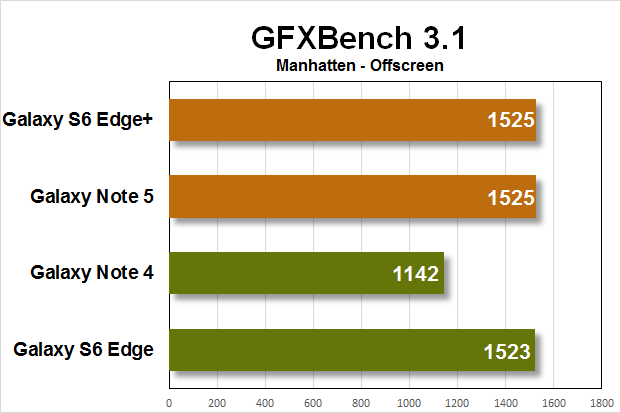

The graphics performance of the Galaxy S6 ge+ Note 5 are also on part with the S6 ge, which is no surprise given they run the same hardware.
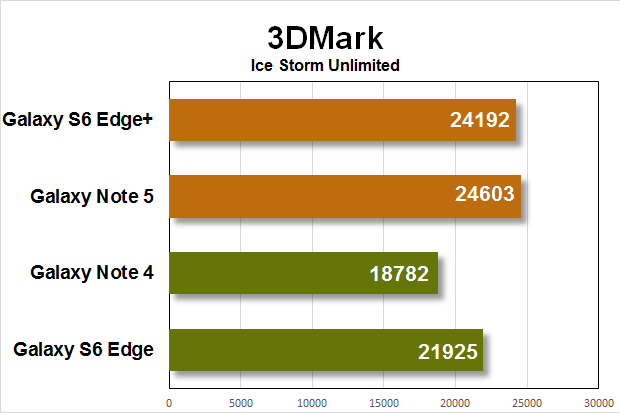

The S6 ge+ Note 5 performed slightly better in our 3D benchmarks.
ll, at least one thing you don’t have to worry about with either phablet is graphics. As a refresher, the Exynos 7420 uses an ARM Mali G. I like that Android smartphones have become these powerful hheld gaming consoles, the graphics processing on Samsung’s flagships has been particularly impressive. Games are even better with the Note 5 ge+’s larger screens—yes, even My Vegas Slots, which I’ll be playing until the day I die (or get enough loyalty points for a comped plane ticket to Vegas).
More RAM does a body good
They might run the same processor, but the Galaxy S6 S6 ge have 3GB of RAM, while the ge+ Note 5 are loaded with 4GB of RAM. That extra gigabyte makes a significant difference in how much memory is made available. I was under the impression that the Note 5 needed the extra bit of RAM to help with the S-n’s applications, but I think it helps make the heavy Touchz interface feel smoother overall.


C-Z shows how your device is using its components The Note 5 is on the left, the Galaxy S6 ge+ is in the middle, the GS6 ge on the right.
I did run a quick C-Z comparison test between the S6 ge, Note5, ge+, just to see what the difference in memory usage actually was. On a clean boot, with all apps closed before restart, the S6 ge warmed up with only 29% available RAM, while the Note 5 ge+ offered 46 percent 52 percent, respectively. It just goes to show that sometimes a little more RAM goes a long way, though we should eventually talk about what’s taking up so many resources on these phones, especially that smaller S6 ge.
Great battery life
already know that the Exynos 7420 is extremely battery efficient, but that doesn’t entirely explain why the Note 5 offers longer battery life even though it has a smaller battery compared to its predecessor.
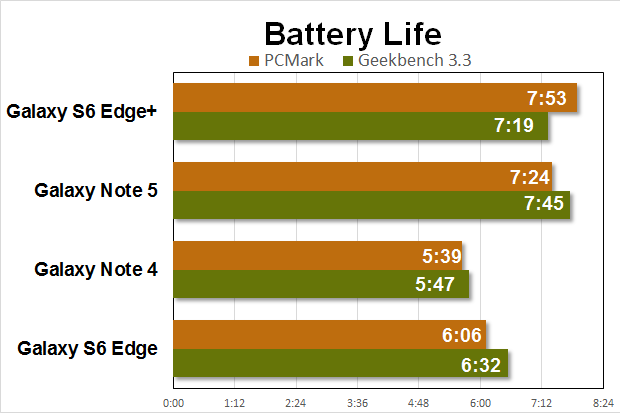

g. This really is a phone that can last you a lifetime—if your lifetime were about 8 hours.
The Note 5 uses a 3,000 mAh battery pack, while the Note 4 used a 3,220 mAh battery pack. So why is the smaller one lasting over an hour longer? It’s likely because the Note 5’s display uses less power at a a given brightness. Samsung’s displays are some of the brightest around, but they use a lot of power when blasting out all that light. At lower brightness levels, as you would use indoors (we test with screens calibrated to 200 nits), Samsung’s latest displays are quite efficient.
I will say, it’s amazing charging a phone for an hour having it revved ready to go for most of the day. The Note 5 ge+ both support fast charging fast wireless charging. You’ll have to fork over $70 to buy the specific fast wireless charging padto enable make wireless charging faster, though (regular wireless charging pads will work, they just won’t charge your phone any faster). Maybe you’d rather just plug it in every night instead.
at’s it like in six months?
’re approaching the six-month mark on the Galaxy S6 Galaxy S6 ge I’m looking forward to revisiting the benchmarks for those devices discovering whether Touchz, several software updates, have wreaked havoc on them or not.
I’m not as worried about the Galaxy Note 5 Galaxy S6 ge+, however. That extra gig of RAM the fact that they’re “next version” flagship phones means they might fare better overall. For now, it’s just nice to know that Samsung has optimizing its powerful hardware to be more energy efficient, rather than trying to show off by increasing gigahertz speed. You can’t offer all that power in a phone if it doesn’t get through a whole day, which is all that anyone really wants out of a phone: to get them from home to work back without needing a charge.














